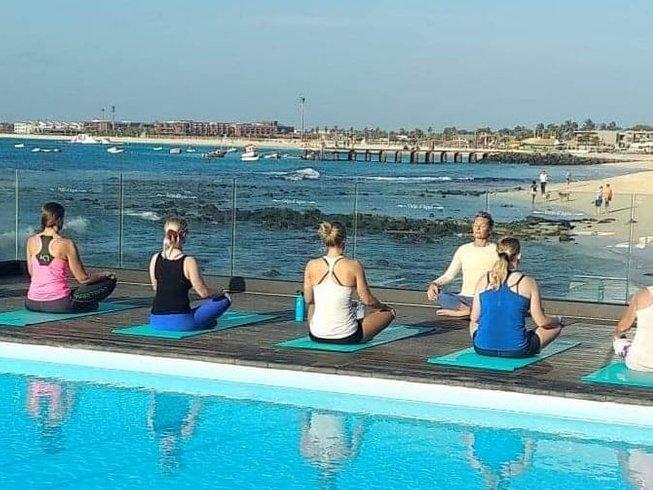Search for yoga retreats
Discover yoga retreats, holidays, and courses from worldwide.
Feeling anxious and stuck in a rut? Reenergize your mind and body with a transformative yoga retreat or embark on a fulfilling journey with yoga teacher training!
Not too long ago, scientists believed the brain loses its ability to form new connections (neuroplasticity) after childhood. Thankfully, recent research reveals our brains can keep adapting throughout life! Here's where yoga comes in.
Exercise for a Calmer, More Adaptable Brain

Studies show exercise plays a crucial role in brain health. It promotes the creation of new brain cells, enhancing your brain's ability to tackle new challenges. Exercise also activates calming pathways, promoting a sense of serenity. However, research also unveils the downside of a sedentary lifestyle.
The Downside of Couch Potato Living
A recent study in The Journal of Comparative Neurology highlights how inactivity, often characterized by excessive screen time, can negatively remodel the brain. Another study by Deakin University's School of Exercise and Nutrition Sciences found a lack of physical activity alters the shape of neurons linked to anxiety. Essentially, a sedentary life weakens your brain's ability to cope with stress, making you more susceptible to anxiety attacks.
Understanding Anxiety: It's All About Neurons
We're all born with predisposed brain cells, some more prone to overreacting to stress than others. This "fight-or-flight" response is helpful in true emergencies, but in everyday situations, it can be counterproductive. Chronic stress can trigger these overactive neurons repeatedly, leading to anxiety that manifests both physically and psychologically.
The Hormonal Dance of Anxiety

Several brain regions work together to create anxiety. The amygdala, an almond-shaped structure, acts as your brain's "fight-or-flight" center, detecting threats and preparing you for action. The hippocampus, located near the amygdala, is the memory and emotion center. When the amygdala perceives stress, it teams up with the hippocampus to activate the sympathetic nervous system, responsible for unconscious bodily functions. This triggers the release of the stress hormone CRH (corticotrophin-releasing hormone) and the neurotransmitter norepinephrine. Norepinephrine relays messages to your organs, causing your heart rate and blood pressure to spike, and your breathing to quicken. These reactions are what we experience as anxiety.
The Anti-Anxiety Squad: GABA and Serotonin
Thankfully, our brains also have built-in anxiety fighters: GABA (gamma-aminobutyric acid) and serotonin. These neurotransmitters help inhibit the stress response. However, a sedentary lifestyle can disrupt the production and function of these neurotransmitters, leading to heightened anxiety responses.
How Yoga Can Help You De-Stress and Thrive

The good news? Yoga can be a powerful antidote to anxiety! Studies show that the hippocampus of physically active individuals, including yogis, has more brain cells. These include the "nanny neurons" that release GABA, the calming neurotransmitter that keeps excessive neuronal firing in check during stressful situations. In simpler terms, yoga helps your brain build a stronger stress-buffering system.
Yoga Retreats: A Path to Relaxation and Rejuvenation
Feeling overwhelmed by daily life? A yoga retreat offers the perfect opportunity to disconnect, recharge, and deepen your yoga practice. Imagine immersing yourself in stunning scenery, surrounded by a supportive community, and practicing yoga under the guidance of experienced teachers. Yoga retreats often incorporate meditation, healthy meals, and workshops to help you delve deeper into your practice and cultivate inner peace.
Embark on a Fulfilling Journey with Yoga Teacher Training
Have you ever considered sharing your love of yoga with others? Yoga teacher training equips you with the knowledge and skills to guide others on their yoga journey. It's a transformative experience that allows you to deepen your own practice while learning to teach effectively and compassionately. Imagine the joy of helping others discover the physical, mental, and emotional benefits of yoga!
Are you ready to de-stress, reconnect with yourself, and maybe even inspire others? Explore the world of yoga retreats and yoga teacher training today!
Craving More Stories?
Join our ShopYogaRetreats newsletter for the latest updates on thrilling
destinations and inspirational tales, delivered straight to your inbox!
We value your privacy. Your email address will never be shared or published.
 English
English Deutsch
Deutsch Français
Français Nederlands
Nederlands Español
Español

